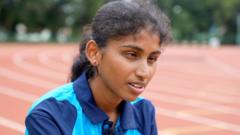This article highlights the journey of blind Indian athletes Rakshitha Raju and Simran Sharma, emphasizing the support of their guide runners and the challenges they face in pursuit of athletic excellence.
Inspiring Achievements of Blind Indian Para Athletes and Their Guide Runners

Inspiring Achievements of Blind Indian Para Athletes and Their Guide Runners
Rakshitha and Simran showcase resilience, determination, and the vital role of guide runners in para athletics.
When you hear stories of triumph and perseverance, the journeys of blind Indian para athletes Rakshitha Raju and Simran Sharma stand out. From adversity to accolades, they have proven that nothing can hold back the human spirit. Rakshitha, who grew up in a small southern Indian village, faced skepticism due to her blindness. Now a prominent middle-distance athlete at the age of 24, she recalls how her grandmother, who is hearing and speech impaired, provided her unwavering support.
Rakshitha was discovered by an astute sports teacher at 13, showcasing her potential as a runner despite her disability. Introduced to the concept of guide runners, she benefited immensely from the partnership with Rahul Balakrishna, a former athlete who became her guide. Their bond strengthened as they trained together. "I believe in my guide runner more than myself," Rakshitha asserts.
Over 8 years of companionship led to their victories at the 2018 and 2023 Asian Games. Upon returning to her village with gold medals, Rakshitha basked in the previously unsympathetic crowd's newfound respect. In contrast, Simran Sharma, who initially ran alone, learned the importance of having a guide after a mishap during the Tokyo Paralympics. She found Abhay Kumar, a young athlete, who stepped in to support her. Although they faced challenges initially, their synergy led them to success.
While Rakshitha competed in the 2024 Paralympics, Simran secured a bronze in the 200m, becoming the first Indian woman with a visual impairment to earn a Paralympic medal. Despite their individual triumphs, both athletes express concerns about the future of their guide runners due to lack of financial support from the Paralympic Committee of India (PCI). Simran emphasizes the need for systemic recognition of guide runners, who currently receive no salary or long-term career prospects.
As Rakshitha and Simran prepare for their next challenges, they hope to inspire countless others like them and transform public perceptions about sports opportunities for disabled individuals. With the upcoming Indian Sportswoman Of The Year (ISWOTY) Award, there is renewed focus on the positive impact that athletes like Rakshitha and Simran can have, pushing the boundaries of possibility beyond disabilities.






